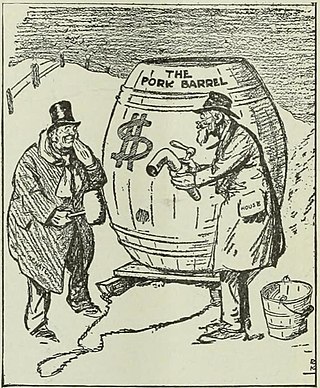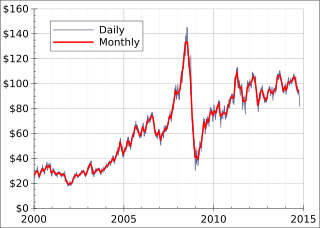Related Research Articles

Pork barrel, or simply pork, is a metaphor for the appropriation of government spending for localized projects secured solely or primarily to direct spending to a representative's district.

The Federal Old-Age and Survivors Insurance Trust Fund and Federal Disability Insurance Trust Fund are trust funds that provide for payment of Social Security benefits administered by the United States Social Security Administration.
The United States budget process is the framework used by Congress and the President of the United States to formulate and create the United States federal budget. The process was established by the Budget and Accounting Act of 1921, the Congressional Budget and Impoundment Control Act of 1974, and additional budget legislation.

The Children's Health Insurance Program (CHIP) – formerly known as the State Children's Health Insurance Program (SCHIP) – is a program administered by the United States Department of Health and Human Services that provides matching funds to states for health insurance to families with children. The program was designed to cover uninsured children in families with incomes that are modest but too high to qualify for Medicaid. The program was passed into law as part of the Balanced Budget Act of 1997, and the statutory authority for CHIP is under title XXI of the Social Security Act.
The power of the purse is the ability of one group to control the actions of another group by withholding funding, or putting stipulations on the use of funds. The power of the purse can be used positively or negatively. The power of the purse is most often utilized by forces within a government that do not have direct executive power, but have control over budgets and taxation.
This article concerns proposals to change the Social Security system in the United States. Social Security is a social insurance program officially called "Old-age, Survivors, and Disability Insurance" (OASDI), in reference to its three components. It is primarily funded through a dedicated payroll tax. During 2015, total benefits of $897 billion were paid out versus $920 billion in income, a $23 billion annual surplus. Excluding interest of $93 billion, the program had a cash deficit of $70 billion. Social Security represents approximately 40% of the income of the elderly, with 53% of married couples and 74% of unmarried persons receiving 50% or more of their income from the program. An estimated 169 million people paid into the program and 60 million received benefits in 2015, roughly 2.82 workers per beneficiary. Reform proposals continue to circulate with some urgency, due to a long-term funding challenge faced by the program as the ratio of workers to beneficiaries falls, driven by the aging of the baby-boom generation, expected continuing low birth rate, and increasing life expectancy. Program payouts began exceeding cash program revenues in 2011; this shortfall is expected to continue indefinitely under current law.

Temporary Assistance for Needy Families is a federal assistance program of the United States. It began on July 1, 1997, and succeeded the Aid to Families with Dependent Children (AFDC) program, providing cash assistance to indigent American families through the United States Department of Health and Human Services. TANF is often simply referred to as welfare.

Safe, Accountable, Flexible, Efficient Transportation Equity Act: A Legacy for Users or SAFETEA-LU was a funding and authorization bill that governed United States federal surface transportation spending. It was signed into law by President George W. Bush on August 10, 2005, as Pub. L.Tooltip Public Law 109–59 (text)(PDF) and 119 Stat. 1144.

The United States budget comprises the spending and revenues of the U.S. federal government. The budget is the financial representation of the priorities of the government, reflecting historical debates and competing economic philosophies. The government primarily spends on healthcare, retirement, and defense programs. The non-partisan Congressional Budget Office provides extensive analysis of the budget and its economic effects. It has reported that large budget deficits over the next 30 years are projected to drive federal debt held by the public to unprecedented levels—from 98 percent of gross domestic product (GDP) in 2020 to 195 percent by 2050.
People's Initiative is a common appellative in the Philippines that refers to either a mode for constitutional amendment provided by the 1987 Philippine Constitution or to the act of pushing an initiative allowed by the Philippine Initiative and Referendum Act of 1987. The appellative also refers to the product of either of those initiatives.

The Stabilization fund of the Russian Federation was a sovereign wealth fund established based on a resolution of the Government of Russia on 1 January 2004, as a part of the federal budget to balance the federal budget at the time of when oil price falls below a cut-off price, currently set at US$27 per barrel.

The Water Resources Development Act of 2007 or WRDA 2007 is a United States law that reauthorized the Water Resources Development Act (WRDA), and authorized flood control, navigation, and environmental projects and studies by the United States Army Corps of Engineers. However, the law does not appropriate funds for those projects and programs. It was passed by the 110th United States Congress on November 8, 2007 over President George W. Bush's veto.
An earmark is a provision inserted into a discretionary spending appropriations bill that directs funds to a specific recipient while circumventing the merit-based or competitive funds allocation process. Earmarks feature in United States Congress spending policy, and they are present in public finance of many other countries as a form of political particularism.
In political science, political particularism is the ability of policymakers to further their careers by catering to narrow interests rather than to broader national platforms.

The United States federal budget consists of mandatory expenditures, discretionary spending for defense, Cabinet departments and agencies, and interest payments on debt. This is currently over half of U.S. government spending, the remainder coming from state and local governments.
Winslow T. Wheeler is the Director of the Straus Military Reform Project of the Project On Government Oversight in the Washington, D.C. area. After 31 years of service in the US Senate and the Government Accountability Office (GAO), he has written and edited several books about national security and the US military.

Greco Antonious Beda Banta Belgica is a Filipino politician who most recently served as chairman of the Presidential Anti-Corruption Commission (PACC) under the Duterte administration from March to October 2021.
The Priority Development Assistance Fund scam, also called the PDAF scam or the pork barrel scam, is a political scandal involving the alleged misuse by several members of the Congress of the Philippines of their Priority Development Assistance Fund, a lump-sum discretionary fund granted to each member of Congress for spending on priority development projects of the Philippine government, mostly on the national level.

The so-called Million People March at Luneta was the first of a series of protests in the Philippines calling for the total abolition of the Pork Barrel fund, triggered by public anger over the Priority Development Assistance Fund scam. Initial calls circulated through social media to convene a protest on August 26, 2013, at Luneta Park in Manila as well as other cities nationwide and overseas. Some media commentators consider this as the first ever massive rally in the Philippines called and organised mostly through social media channels.
The 1994 electoral reform in Japan was a change from the previous single non-transferable vote (SNTV) system of multi-member districts (MMD) to a mixed electoral system of single-member districts (SMD) with plurality voting and a party list system with proportional representation. The reform had three main objectives: change the one-party dominance of the Liberal Democratic Party (LDP) from the previous 1955 system to a two-party system with alternation in power, reduce the cost of elections and campaigns, and change campaign focus from individual-centered to party-centered.
References
- ↑ Hofileña, Chay (July 14, 2014). "Understanding the SC ruling on the DAP". Rappler. Retrieved 23 November 2015.

